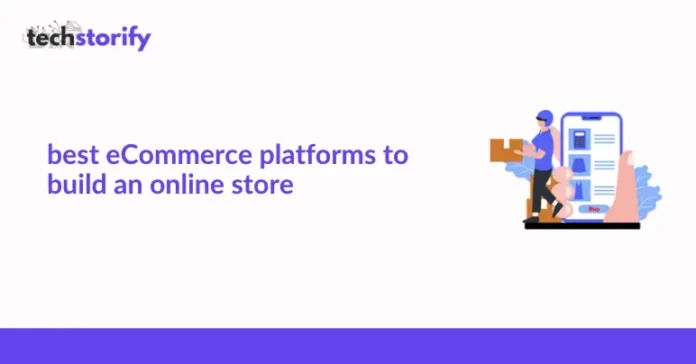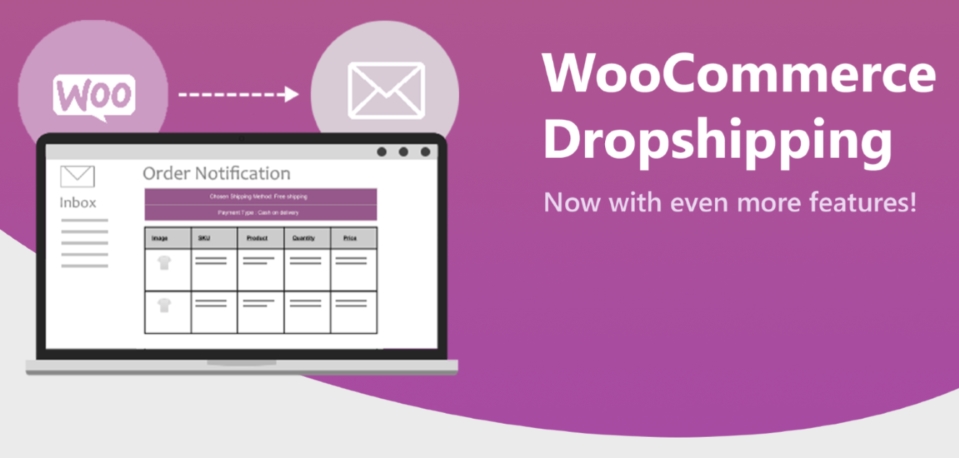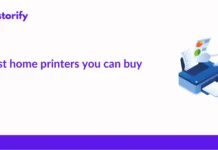Over the years, there has been a significant rise in the number of eCommerce platform users. The main reason behind this is to expand the business and reach out to more people situated in different regions.
An eCommerce platform helps the businessman or seller to create an online store, list his products and their prices and let people give orders directly without having direct communication with the seller.
Other than selling the product online, eCommerce stores help in understanding customer behavior through analytics, tracking, and other methods.
It also gives customers ease of paying through different media such as credit cards, cash on delivery, or net banking.
There are various ecommerce platforms on the internet, to find out what is best for your business and requirements, dive into our list of 10 best eCommerce platform.
Contents
- The best eCommerce platforms to build an online store
- 1. Shopify
- 2. BigCommerce – Best eCommerce platform for large-volume sellers
- 3. Adobe Commerce (formerly Magento)
- 4. Woocommerce – Best eCommerce platform for adding a shopping cart to an existing WordPress site
- 5. Wix.com – Best eCommerce platform for simultaneously creating a store and business website
- 6. 3DCart
- Basic Features:
- 7. OpenCart
- 8. EcWid
- 9. Volusion
- 10. Squarespace
- Wrap Up
- Ecommerce platforms FAQ
- 1. What is an ecommerce platform?
- 2. What are the most popular ecommerce platforms?
- 3. What features should I look for in an ecommerce platform?
- 4. How do I choose the right ecommerce platform for my business?
The best eCommerce platforms to build an online store
1. Shopify
Shopify is one of the most used eCommerce platforms and is the first choice of every professional dropshipping expert or eCommerce business owner. Shopify is used by many big businesses and small businesses too.
You can set up your first store on Shopify without any advanced technical knowledge as you don’t have to code anything or design the front end.
The setup is simple and straightforward, you need to focus on adding the product and pricing, that’s it.
Moreover, there are dozens of add-ons and plugins that are essential for an eCommerce business. The analytic tool helps in finding out the statistics of the entire day, the revenue generated, units sold, and the main source of traffic.
Features:
- Fully customizable
- Unlimited monthly bandwidth
- Supports various payment gateways
- Reliable customer support
Price: Basic Shopify: $39/month; Shopify: $105/month; Advanced Shopify: $399/month
Integrated sales channels: Facebook, Instagram, Google, Walmart Marketplace, eBay, and Amazon.
Mobile app features: Suite of mobile tools to fully manage your online business.
POS: Yes.
You can also try Shopify free for 14 days and there’s no need to enter the card details too.
2. BigCommerce – Best eCommerce platform for large-volume sellers
Another leading eCommerce platform for you to set up your first online store. It was founded by Eddie Machaalani and Mitchell Harper and is situated in Austin. BigCommerce is a reliable ecommerce solution for small businesses but is quite pricey than the other eCommerce sites in this list.
It comes with extra features such as an abandoned cart and allows you to connect your shipping account with the store for convenience. The way BigCommerce charges is quite different, you can only do a limited sale on the basis of the plan you have opted in.
Features:
- Create and customize your online store
- Fulfill orders faster by integrating your shipping account
- Accept payments through various media
- Analyze customer behaviour
Pros:
- Fully hosted
- Comprehensive business management abilities
- Multiple payment options with no transaction fees
Cons:
- No native POS
- Expensive themes
- Design options aren’t user friendly
Price: Standard: $29.95/month; Plus: $79.95/month, or $71.95/month when paid annually; Pro: $299.95/month, or $269.96/month when paid annually; Enterprise custom pricing.
Integrated sales channels: Google Shopping, Facebook, price comparison engines, eBay, Amazon, Walmart, Etsy, and Instagram.
Mobile app features: View analytics, update orders, manage inventory and products, and search for customers; some features are Android-only.
Point-of-sale: Yes.
3. Adobe Commerce (formerly Magento)
If you require an open-source eCommerce platform, Magento is a perfect choice. The updates are making it a more stable and reliable eCommerce platform for small or big businesses.
It was acquired by Adobe in 2018 and was then split into two versions:
- Magento Open source
- Magento E-commerce
You can set up your clothing store, cosmetic store, book store, and various other small-scale businesses on Magento. You can choose from over 5000 extensions on the basis of your store’s requirements.
The level of service isn’t good for the open-source version as compared to the Magento Commerce version. The pricing isn’t published on the site, you need to contact the sales team and get a quote.
Pros:
- Free to start
- Not hosted
- Easy to find developers for customization
Cons:
- Requires technical knowledge
- Not SEO-friendly natively
- Can seem complicated for beginner users
Price: Custom pricing only.
Integrated sales channels: Amazon.
Mobile app features: n/a
Point-of-sale: Third-party extensions available.
G2 rating ⭐: 4.6/5
4. Woocommerce – Best eCommerce platform for adding a shopping cart to an existing WordPress site
Woocommerce is the first and foremost choice of every WordPress user as it is more like a shopping cart plugin than an independent platform and helps over 30 percent of small businesses to establish their eCommerce store.
It is suitable for those who already have an established blog and are looking forward to opening a side store for regular visitors. Woocommerce comes with various integrations and payment methods and pretty much does everything you would want to be done.
The plugin is available to download for free on WordPress, all you have to do is install the plugin on your WordPress site and set up your online store. If you feel like you are stuck up somewhere, contact the support, or read the documentation on the site.
Features:
- Flexible and secure payment gateway
- Order management system
- Android and iOS apps to manage the store on a smartphone
- Lots of add on available
Pros:
- Excellent option for WordPress users
- Open source and highly customizable
- Over 6,000 integrations and WordPress plug-ins
- Active developer and expert community
Cons:
- Self-hosted
- Requires efficiency in WordPress
- High costs for hosting, development, maintenance, and more
Price: Average monthly fee is up to $30; WooCommerce estimates costs to be $120/year for hosting, $15/year for domain name registration, up to $100/year for your site theme, up to $108/year for shipping, 2.9% plus $0.30 per sale, up to $348/year for marketing and communications, up to $79/year for SEO, up to $65/year for SSL certificate.
Integrated sales channels: Google Shopping, Etsy, eBay, Facebook, Amazon, Pinterest, and Walmart; integrations are disjointed.
Mobile app features: Add products, manage orders, and view analytics.
Point-of-sale: Native POS available.
G2 rating ⭐: 4.4/5
5. Wix.com – Best eCommerce platform for simultaneously creating a store and business website
Wix is a user-friendly drag-and-drop website builder that offers customizable templates, web hosting, and domain name registration.
You might have seen Wix’s ad on youtube a lot of time, they spend a lot on marketing and also making their platform a better place for small businesses. Wix is almost similar to WordPress in many aspects and is typically a cloud-based website builder.
If hiring a web designer is out of your budget, you can use the front-end builder of Wix to design your store or blog. With additional plugins, adding new features to the site will become easier for you.
Features:
- Small business-friendly
- Optimized for smartphones
- Amazing customer support
- Drag n’ Drop Website Editor
- Analytics tools
Pros:
- Fully hosted
- Easy to use
- Free forever plan
- Lots of support
Cons:
- Tracking and analytics require paid plan
- Site isn’t transferrable
- Free plan forces Wix branding
Price: Business Basic: $23/month; Business Unlimited: $27/month; Business VIP: $49/month.
Integrated sales channels: Facebook and Instagram require third-party app Ecwid.
Mobile app features: The ability to manage your website, though lacks key business tools like inventory management; requires separate app to use mobile POS.
Point-of-sale: Yes.
G2 rating ⭐: 4.2/5
6. 3DCart
3DCart is one of the oldest horses in the race of eCommerce platforms and is used by more than 22,000 merchants for online trading. Even though it is in the market for so long, 3Dcart isn’t as popular as Shopify or Woocommerce.
Using 3DCart would be a great choice if you have built online stores before and have experience in the eCommerce business. The e-commerce software has various tools and resources that you can take advantage of.
Moreover, you need to hire a front-end developer for the UI as you cannot drag and drop to create your own user interface.
Features:
E-commerce store tools such as inventory management, analytics & more
- Search engined optimized
- Higher conversion rates
- 200+ supported payment providers
- Integrate with Facebook, Amazon and other online stores
Pricing
The pricing of 3Dcart, in my opinion, is better than the other eCommerce platforms in this list. You receive a small discount if you choose to pay on a yearly basis and every plan comes with some fixed features.
Basic Features:
- No transaction fees
- Domain Registration
- Shopping Cart
- Unlimited Orders
- 24×7 Customer Support
- Facebook Store integration
- Secure & fast Web Hosting
- 50+ Mobile-Ready Themes, in case you couldn’t find a UI designer
- Blog feature
- Unlimited Bandwidth
- 200+ Payment Providers
- API Access for developers
Pros:
- Extensive shopping cart solution
- Multichannel retail options
- Strong marketing abilities
Cons:
- Not good for beginners
- Limited free themes
- Lacks critical ecommerce features
Price: $9.99 per month.
Integrated sales channels: eBay, Amazon, Facebook.
Mobile app features: n/a
Point-of-sale: Available for purchase.
G2 rating ⭐: 3.8/5
7. OpenCart
OpenCart is one of the most used eCommerce software used by 342,000 eCommerce websites as of now. Unlike Wix and Woo-commerce, OpenCart is an open-source eCommerce software that can be installed on a site for enabling eCommerce functions.
With OpenCart, managing an ecommerce store becomes easier as it is not complicated at all, especially the admin dashboard with a straightforward user interface and simple navigations.
Another major advantage of OpenCart is its marketplace. It has more than 13,000 modules, themes, and extensions. So if you want to integrate something with your eCommerce store, there’s a good chance it’s available on the OpenCart marketplace.
Furthermore, it has more than 14,000 modules, themes, and extensions that can powerup your ecommerce store with more functions and integrations.
Features:
- Free to use
- No monthly or yearly subscriptions
- 14,000 modules
- User Management
- Multi-store feature
Pros:
- Open sourced and highlight customizable
- Hundreds of integrations
- The platform is free
- Low ongoing development costs
Cons:
- Limited built-in marketing and sales features
- Not the fastest platform
- Self-hosted, so you’ll control hosting, development, and maintenance
Price: Free.
Integrated sales channels: n/a
Mobile app features: Varies.
Point-of-sale: Yes.
G2 rating ⭐: 4.3/5
8. EcWid
The next eCommerce platform in this list is EcWid which is also an alternative to WooCommerce for WordPress users. Although it is not as famous as WooCommerce but does the job effectively.
Not only WordPress, but Ecwid can also be used with other CMS too, some of them are Wix, Weebly, Squarespace, Tumblr, and Blogger. If you have around 10 products in your catalog, you can use the free forever plan but you won’t be able to integrate your Ecwid store with any website or marketplace.
Pricing
There are three plans of EcWid namely,
- Venture — $15 per month
- Business — $35 per month
- Unlimited — $99 per month
9. Volusion
Volusion is another amazing eCommerce platform that has been helping eCommerce experts for over 20 years and is being used by 180,000 websites generating over $28 billion dollars in sales.
Creating, managing, and selling products with Volusion is simple. It is best for selling physical products as there is no support for digital downloads.
Furthermore, the support service is top-notch but depends upon the plan you have chosen, a higher plan means quick support.
Features:
- Content Editor
- Beautiful and responsive themes
- Various payment gateways
- Secure checkouts
- Barcode generator
- Stock management
Pros:
- Easily customized and extended
- 24/7 support
- Nice looking, responsive templates
- User friendly website builder and management tools
Cons:
- Premium templates can be expensive
- Free option is limited
- Forced to pay for an SSL
- Can only sell physical products
Price: $29 per month.
Integrated sales channels: n/a
Mobile app features: n/a
Point-of-sale: Available as add-on.
G2 rating ⭐: 3.2/5
10. Squarespace
Squarespace is similar to Wix, a website builder with an integrated eCommerce platform. You can create an attractive and responsive store on your own by using templates or starting from scratch.
It is suitable for new ecommerce stores that are not yet popular and have very few sales a month. You can kickstart your ecommerce store with Squarespace and move it to a different eCommerce site or platform when you start receiving more orders.
Features:
- Add as many products as you want
- Manage subscriptions
- Sell both physical and digital products
- Abandon cart recovery feature
Pros:
- Hosted, no worries about maintenance and server costs
- Professionally designed templates
- No transaction fees
Cons:
- Not just focused on ecommerce
- Limited multichannel sales
- No phone support
- Hard to override themes CSS and HTML
Price: Personal: $16/month, or $12/month when paid annually; Business: $26/month, or $18/month when paid annually; Basic Commerce: $30/month, or $26/month when paid annually; Advanced Commerce: $46/month, or $40/month when paid annually; Enterprise pricing also available.
Integrated sales channels: Shopping Feed extension to sell on Amazon, eBay, Etsy, and Google Actions.
Mobile app features: Website editing, shipping label scanning, order management, inventory management, and customer communication.
POS: Available via mobile app.
G2 rating ⭐: 4.4/5
Wrap Up
With a significant rise in online shoppers and online stores, it is necessary to know about eCommerce platforms. If you are planning to start your own online store, consider using any one of the above-listed eCommerce platforms.
In this article, we have penned down detailed information of the 10 best eCommerce platforms. This will help you to decide which ecom platform is suitable for your business.
Ecommerce platforms FAQ
1. What is an ecommerce platform?
An ecommerce platform is a software application that allows businesses to create an online store to sell products and services.
2. What are the most popular ecommerce platforms?
- Shopify
- BigCommerce
- Wix
- Squarespace
- WooCommerce
- OpenCart
- Big Cartel
- Volusion
3. What features should I look for in an ecommerce platform?
Some key features to look for in an ecommerce platform include ease of use, scalability, mobile responsiveness, secure payment processing, inventory management, shipping and tax calculations, and marketing tools.
4. How do I choose the right ecommerce platform for my business?
To choose the right ecommerce solution for your business, consider your budget, business needs, and future growth goals. Research and compare different platforms, read reviews, and take advantage of free trials or demos to test out the software before committing.
















